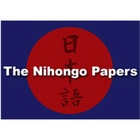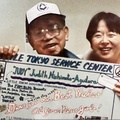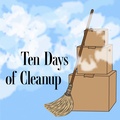Chapter 2 >>
Haru Shishido reached out for the dashboard as their Model T truck hit some potholes in the dirt road. Papa was going much faster than usual. If Mama was in the car, she would be saying, “Papa, abunai.” Papa, danger. But Mama was at home resting with the baby. Auntie Himeko was with her. Auntie, who was visiting from Sacramento, was a stern woman who lost her patience with Haru. So when Papa rushed to the car to do some errand, Haru chased after him, eager to get away from her crying younger brother and her cranky auntie.
“Where are we going, Papa?” she asked.
Papa did not answer. Haru thought that they were going into town to pick up supplies at the dry goods store on Main Street. But they were instead driving south towards a large Victorian house in an open field.
Uncle Sab’s house. Haru remembered going to the house all of the time and playing with her boy cousins at the bottom of the curved wooden staircase. But during the past two years, they stopped going. Even her cousins didn’t talk to her much at school.
“Nanika atta,” explained Mama. Something happened. Haru knew enough not to ask Papa or Mama directly. She would have to wait instead for the explanation to come to her. Maybe it would be revealed today.
Papa drove into the dirt driveway in front of the two-story house. Haru could see heads of lettuce peering out from the soil like little green gophers.
Papa opened the driver’s side door and jumped out. “Saburo! Saburo!”
Haru thought she saw a curtain move through a window on the second floor.
Papa didn’t bother to go to the front door and instead headed for a building on the side. The greenhouse. It was relatively new, but a few panes were shattered and remained unfixed.
There were all sorts of plants in the greenhouse. Seedlings that resembled flowers. What was Papa looking for?
Uncle Sab then appeared in the doorway of the greenhouse. He was much shorter and thinner than Papa and his face was about two shades lighter. He wasn’t an outside man, she had heard Mama say one time. If he stayed back in Japan, he probably would have been in school, not out in the fields.
Papa didn’t bother to say hello. “Where are they?”
Uncle Sab folded his arms and Haru noticed a vein, as thick as a cord, bulge from his knuckle to his wrist. Even though uncle wasn’t an outside man, he was still plenty strong. And like Papa, he had a wild and untamed temper.
Papa was now at the other end of the greenhouse. “We need to destroy these,” he said, gathering up some strawberry plants in his arms.
Uncle Sab pulled out a hunting rifle from the side of the greenhouse. “It’s time for you to go, Niisan,” he said.
Haru couldn’t breathe. She must be dreaming. That wasn’t her uncle aiming his gun at her forehead.
Haru could hear the dropping of wooden plant containers on the ground. Papa had his hands raised and he quickly rushed to Haru’s side. “Saburo,” he whispered. “What are you doing?”
“Go,” Uncle Sab said. “Go before I tell the police that I caught two thieves in my greenhouse.”
Papa didn’t drive fast on their way home. Haru looked outside, her eyes blinking away tears. She was too afraid to ask Papa what had happened to Uncle Sab to make him hate her so.
“Let’s not tell Mama about this,” Papa said, parking the car near their packing shed. Dirt from the strawberry plants still remained on his shirt. “I’ll make you some ice cream tonight.”
Haru nodded, but stayed in the car for a few minutes by herself. It would take more than ice cream, her favorite dessert, to make her forget.
* * *
Carlos Yamashita was used to being ignored. So it didn’t surprise him that the airport security didn’t take a second look at his McDonald’s bag. It was a good thing, too, because if they did, they would find a strawberry plant where they should have found a meat patty in between two hamburger buns.
This whole trip was not what Carlos expected. First of all, he thought they were going to Nippon, but instead they were flying to Los Angeles, Estados Unidos. And once they arrived in California, Bisabuelo and his father rented a car and drove an hour up the coast to a place called Oxnard. There they rented two hotel rooms. (Bisabuelo said Carlos’ father snored too loudly—which was fine with Carlos, because he preferred a wall separating himself and Bisabuelo. And besides, his father’s snoring didn’t bother him—in fact, it comforted him.)
The next morning Father was up, buttoning an old plaid work shirt. The sun wasn’t peeking through the heavy drapes, so Carlos knew that it was very, very early.
“Where are you going?” Carlos asked.
“Work.”
“Work?”
“I’m counting on you to take good care of Bisabuelo,” Father said. Before he left, he gestured towards a paper bag on the floor. Carlos went back to sleep and when he woke up a second time, he thought that he might have been dreaming. But the bed next to him was empty, aside from the disheveled sheets. Inside of the paper bag were bread, cereal, salami, oranges, liter of Coke, and a package of something called Pop-Tarts. Carlos opened the carton. The Pop-Tarts were like flattened empanadas, filled with strawberry jam. The Coke was not cold, but Carlos drank some anyway in a disposable plastic cup that the hotel provided.
The television set was large and flat. After going through dozens of cable shows, Carlos finally found a channel that showed only cartoons.
Around noon, Carlos heard banging on the door. It was Bisabuelo balancing on his walker, a duffel bag around his shoulder.
“Let’s go.”
“Where?”
Bisabuelo told him to get his wheelchair, which Carlos did. “Do you know where Father is?”
The old man didn’t reply. Instead he gestured for Carlos to wheel him to the elevator. Once they were downstairs, there was more pushing along a long paved road. It seemed to Carlos that they had traveled miles, past little stands selling fresh fruit, vegetables, and flowers and finally fields as far as he could see. This Oxnard, with majestic mountains in the distance, was beautiful. Almost as beautiful as Yguazu, Paraguay. Carlos then felt a pang of homesickness. How long would they be living like hoboes with paper bags filled with Coke and Pop-Tarts?
“Stop.” They were now beside an old parked car along the road. But there was nothing else around them. Only a group of men and women in bandanas bent over and picking strawberries in the fields across the way.
Bisabuelos pulled out binoculars from his duffel bag and watched the pickers across the way. All of them had dark hair—it was difficult to tell whether they were Latino or Asian. A Japanese man a little older than Father stood beside the crates, taking notes on a clipboard. One of the pickers, the way he moved, looked familiar. He wore a baseball cap and a worn plaid shirt. Carlos rubbed his eyes and looked again. What was Father doing picking strawberries here?
***
Sayuri stood over her father-in-law at his desk in his office trailer. “Doesn’t it mean something to you?”
Bob looked up wearily. Sayuri knew that gaze. She was a good-for-nothing Japanese daughter-in-law. A girl whose nose was in books, not in cooking or planting. A girl who was totally of no use.
“And how can you explain this?” Sayuri pointed to a page in the old Japanese textbook which once belonged to Bob’s aunt. On the title page was a circle surrounded by thirteen stars. And posted on the trailer wall was some vandalism in the fields—a round dirt mound with thirteen strawberry plants arranged around it.
“A coincidence,” said Bob. The phone began to ring. “Excuse me, Sayuri, I’ll have to answer that.” He sounded almost relieved, like he would rather take a call from a complaining customer than his urusai daughter-in-law.
“You gotta understand; he’s under a lot of stress right now,” said Zip, the Shishido Farm foreman who stood nearby. Zip, who had a Virgen de Guadalupe tattoo on his forearm, was a science man, but his heart was open to signs of wonder, too. “After hearing about those folks dying in Canada after eating strawberries, everyone’s been canceling their orders.”
Sayuri took a deep breath and brought the textbook over to Zip.
“What do these names and numbers mean?” Sayuri asked about the careful writing on the side of the margins.
“Those are some old, old varieties.” Zip had been in the business since birth. His own father had been an itinerant strawberry picker. Zip had gone on to get educated with a B.S. in fruit science at Cal Poly, San Luis Obispo. “Those are some that were popular in the 1920s. Looks like these varieties were crossed with one another.”
Sayuri couldn’t help but to look lost.
“Each of these varieties have, let’s say, a different DNA. You change it by breeding different varieties together. It’s a laborious process. It can even take decades.”
“So it’s a kind of recipe for a certain kind of strawberry.”
“Well, I guess that you can call it that.”
“Do you know if this is the recipe for a strawberry that’s currently being sold?”
Zip looked as the names again. “I’d have to research on that one. Why is it so important?”
“It’s what is written down here.” Sayuri pointed to a kanji that was written in thick pencil. “This says poison. Death.”
“Killer strawberries?”
They both remained silent for a moment.
“What are you saying—that somehow this variety in this book is the same one that’s making people sick? That’s impossible.”
Now Zip was sounding a lot like Bob. The only way to convince them was to find one of these killer strawberries and bring them to Shishido Farms.
* The Nihongo Papers” is a work of fiction. The characters, incidents, and dialogue are drawn from the author’s imagination and are not to be construed as real. Any resemblance to actual events or persons, living or dead, is entirely coincidental.
© 2007 Naomi Hirahara





